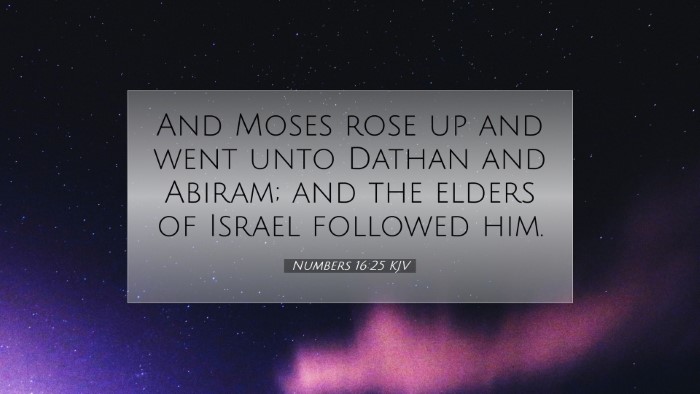Commentary on Numbers 16:25
Bible Verse: "And Moses rose up and went unto Dathan and Abiram; and the elders of Israel followed him."
Introduction
This passage occurs in the broader narrative of Numbers 16, which recounts the rebellion of Korah, Dathan, and Abiram against the leadership of Moses and Aaron. This moment is pivotal in understanding the gravity of rebellion against God's chosen leaders and the consequences that follow. Notably, it is a demonstration of God's justice and the seriousness with which He views authority and order within His people.
Context and Background
The chapter opens with a significant revolt against Moses, reflecting discontent among the children of Israel. Dathan and Abiram, leaders of the rebellion, rejected Moses, suggesting that he had taken them out of Egypt only to bring them to a desolate land. This challenge to Moses' leadership was ultimately a challenge to God's authority, for it was God who appointed Moses.
Exegesis of Numbers 16:25
Moses's action of rising and going to Dathan and Abiram is key to understanding his leadership style. It illustrates not only his responsibility as a leader but also his willingness to confront those in rebellion. The elders accompanying him signify a broader recognition of Moses's authority, depicting a contrast between the God-appointed leadership and the usurpers who sought to destroy it.
Insights from Matthew Henry
According to Matthew Henry, Moses exhibiting courage by approaching the rebels underscores the gravity of their insurrection. He emphasizes that Moses did not flee from the opposition but stood resolute. Henry draws attention to the principle that God often uses the meek and lowly—evident in Moses's humility yet resolute stance against rebellion.
Insights from Albert Barnes
Albert Barnes highlights the significance of the elders who followed Moses as a testament to the support of God’s ordained leadership. He notes that their presence symbolizes divine authority and the collective acknowledgment of Moses's chosen role. He points out the necessity of spiritual leaders confronting insurrection, as it reinforces the structure God has established in His assembly.
Insights from Adam Clarke
Adam Clarke’s commentary offers a detailed analysis of the sociopolitical dynamics at play. He remarks that the act of Moses approaching Dathan and Abiram represents a direct confrontation with the prevailing dissent. Clarke observes that this bold act was crucial in informing the nation of the seriousness of their rebellion against God’s appointed leader. He emphasizes that the consequences of their actions not only affected them but had implications for the entire community of faith.
Theological Implications
This narrative brings forth several theological insights for modern readers:
- The Nature of Authority: The passage teaches about the divinely instituted order within the Church and the importance of recognizing and submitting to God-ordained leaders.
- The Call to Accountability: Leaders like Moses are charged with confronting sinful behavior within their communities, aligning with scriptural mandates for accountability.
- The Consequences of Rebellion: The severe consequences faced by Korah, Dathan, and Abiram serve as a stark warning against rebellion, reflecting God's holiness and justice.
Application for Today
For pastors, students, and theologians, this passage is crucial in understanding the weight of spiritual leadership and the expectation of congregants to uphold the established order. It serves as a reminder that rebellion, whether against God or His appointed leaders, incurs serious repercussions, emphasizing the need for humility, submission, and respect within the church framework.
Conclusion
In reflection on Numbers 16:25, we see that Moses' courageous pursuit of accountability provides a model for future leaders in addressing discord and rebellion. This story reminds us to honor God's design for leadership, ensuring our actions align with a spirit of unity and respect. Through the insights of Henry, Barnes, and Clarke, we find a clear understanding of authority, rebellion, and the importance of diligent leadership within the body of Christ.


